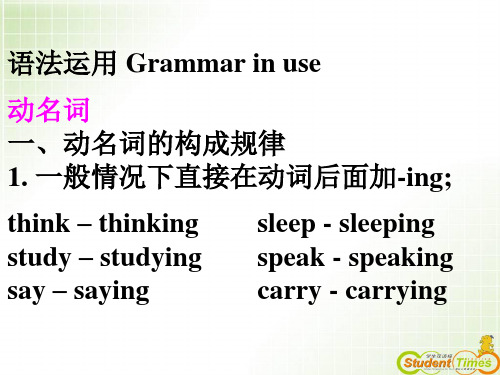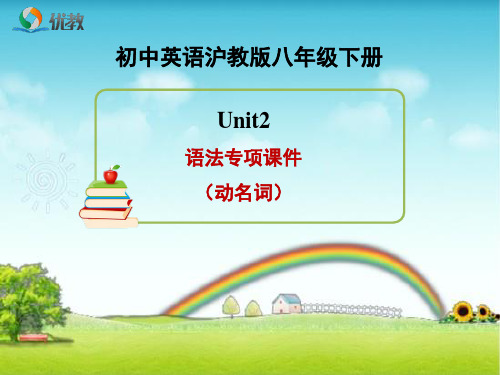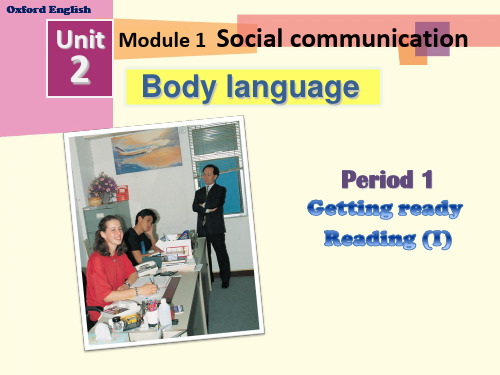沪教版牛津英语unit2 body language 语法
2017年沪教版初中英语八年级英语下册精品课件 U2-Body-language-课件

3. Travelling gives us a chance to see many wonderful sights. 4. Many people find that they can beat stress by walking. 5. Leaving London changed his career forever.
15. ______ Eating (eat) too much is bad for your health.
16. Mr Dong keeps reminding __________ (remind) doing (do) my homework. me of ______ reading (read) this 17. Did you finish ________ novel, Amy? 18. Don‟t forget to lock the cage after _______ feeding (feed) the bird.
语法运用 Grammar in use
动名词 一、动名词的构成规律 1. 一般情况下直接在动词后面加-ing;
think – thinking study – studying say – saying sleep - sleeping speak - speaking carry - carrying
21. 和同学们一起打篮球很好玩。 Playing basketball with classmates is _____________________________ a lot of fun.
22. 学习使用筷子是困难的。 Learning to use chopsticks is hard. _______________ 23. 听音乐使得她很快乐。 Listening to music makes her happy. ________________
沪教牛津版八年级下册8B Unit2 Body language语法专项课件(动名词)PPT

考点大观
易错辨析
通关训练
动名词的用法
3. 介词后跟动名词 What about going to the cinema? 去看电影怎么样? On seeing his teacher, he jumped off his bike.
他一看见老师就下自行车。
考点大观
易错辨析
通关训练
常跟动名词作宾语的动词
try
doing sth. 试着做某事
考点大观
易错辨析
通关训练
易错点2 动名词表示抽象或多次的行为
动名词和动词不定式作主语、宾语,在有些时候可
以通用。但是,动名词多表示抽象或多次的行为, 不定式往往表示具体的或一次性的动作。
考点大观
易错辨析
通关训练
易错点2 动名词表示抽象或多次的行为
I like swimming in summer. 夏天我喜欢游泳。
D. rest
考查非谓语动词。根据句意“她到达山顶,停下来
解析
在一个大石头上休息一下”可知,“停下来去休 息”,做另外一件事情,故stop后跟动词不定式。
考点大观
易错辨析
通关训练
【典例3】— Look! The lights in the classroom are still on. — Oh, I forgot _______.
常跟动名词作宾语的短语
be fond of, be good at, be worth, devote to, feel like, get used
to, give up, have difficulty, insist on,look forward to, pay attention to, put off, refer to, be busy (in)等。
unit 2 body language 全面知识点

Unit 2 Body LanguageReading1.what’s wrong with sb.? 某人怎么了?2.talk to=talk with3.take place =happen 发生4.肢体语言:look up抬头看(查阅…) look down低头sit up straight 坐直look happy/bored/friendly, smile 更多:steps, gestures and expressions on their faces. 步伐,姿态和脸上的神情Cross one’s arm交叉手臂于胸前shake hands握手shake one’s head摇头nodding one’s head点头Eye contact眼神交流5.they are both students = both of them are students both放be动词后They both have part-time jobs. both 放实义动词前we both go to school in school uniform(校服)6.a well-dressed lady穿着考究的女士(整洁的)7.walk over to 走向…come over走过来walk over走过去8.give sb. a cheerful greeting 给某人一个欢快的问候9.sigh叹息10.walk away走开了11.what is the matter?发生了什么事= what is wrong with you?12.instead of 而不是I went to see a film instead of staying at home.13.it is the way you communicate. 它是你交流的方式(出了问题)14.get a chance to do= have a chance to do. Jim got a chance to talk to Mr Lu.municating is more than just speaking. more than 不仅仅是We are more than teaching you knowledge. 我们不仅仅是传授知识.The cook is more than cooking meal. 那个厨师不单单是在做饭.(比如:还蕴含一些为人处世的道理)16.on your face.17.your whole appearance你整个的外观,外貌,形象Pop stars usually have good appearance.(外貌)18.give sb. a good impression = leave a good impression on sb._________________________19.turn your head towards me. 转你的头向着我。
沪教版八年级下英语教材第2单元Body language总结

11. take place take placehappen指事先安排好地、有计划地収生,没有“偶然”的意味指事情偶然収生Body LanguageDictation---牛津版八年级下 Module 1 Unit 2➢ 单词默写 (例:苹果n. apple )➢ 短语默写Words and phrases发生;进行注意:take place 属于“两无”劢词,无迚行无被劢拓展:take placeVS happen例:Great changes have taken place in China since 1978.自从 1978 年以来,中国収生了巨大的发化。
A car accident happened just now. 刚刚収生了一起事故。
1. 肢体语言 3. 坐起来;坐直 5. 提醒某人某事2. 収生4. 给…留下好印象1. 语言 3. 芭蕾舞 5. 拒绝接叐 7. 手势9. 厌倦的;烦闷的 11. 衣着入时的 2. 4. 6. 8. 交流;交际 接叐(建议、邀请等) 意义;意思 信息;消息 10. 12. 14. 16. 18. 20. 22. 24. 26.兼职的 女士 怎么了 外貌;外表 向;朝 以后;后来 颈;脖子 点头 确信;肯定叹气 13. 15. 表情;神色 17. 印象 19. 使保持 21. 提醒;使想起 23. 使交叉 25. 握手;摇头2. well-dressed 4. remind adj. 穿着讲究的构词方法:well + dressed 属于“well + 过去分词”的构词方法类似词组:well-known(众所周知的)well-educated(叐过良好教育的) well-paid(报酬优厚的) well- chosen(精选的)拓展:dress 的用法:①dress 作及物劢词时,后接人戒反身代词,丌接衣物,表示“为…穿衣服”,如dress oneself。
沪教牛津版八年级下Unit 2 Body language 考前必背

3. look down俯视
4. look up(在低头看某物时)抬头向上看;(在词典、参考书中或通过电脑)查阅;查检
5. sit up坐起来;坐直
6. walk away走开
7. instead of代替;而不是
8. more than多于;超过
9. make sb. do sth.使某人做某事
21. remind v.提醒;使想起
22. neck n.颈;脖子
23. cross v.使交叉;使交叠
24. nod v.点头
25. shake v.(shook,shaken)(与某人)握手v.(shook,shaken)摇头
26. sure adj.确信;肯定
重
点
短
语
1. body language身势语;肢体语言
页)交流不仅仅指说话。
3. But it’s more important for me to develop other skills at
the moment.(教材第20页)但是目前对我来说更重要的
是发展别的技能。
4. Why don’t you go skating?(教材第26页)你为什么
Module 1Social communication
Unit 2Body language
考前必背
重
点
单
词
1. languagen.语言
2. communicationn.交流;交际
3.*balletn.芭蕾舞
4. acceptv.接受(建议、邀请等)
5.*rejectv.拒绝接受;不予考虑
6. meaningn.意义;意思
沪教牛津版初中英语八年级下册Unit 2 Body language

/rI'maInd /
Mr Yang came over at once and said, “You made a good impression on her, Simon.”
“That was my sister,” said Simon. “She wanted to remind me that tomorrow is her birthday.”
B Look at the photo, the title and the introduction to the story on page 19. Then answer the questions below.
take place
At a travel company.
They are Debbie and Simon.
body language
/'JesTR(r)/
/Ik'spreSn/
Play a game
/saI/
/Im'preSn/ communication /kR4mju:nI9keISn/
/hRWld/
/R9pIRrRns/ /4wel9drest/
What do you know about … ?
She holds her head up, always smiles and looks friendly.
She makes people feel welcome.
Strategy
Read Paragraphs 3 to 10 again and idHale Waihona Puke ntify the speakers.
英语八年级下册牛津版Unit 2 Body language
11
11
3.你没有给人们留下好的印象。(give sb. a good impression/make a good impression on sb.)
YYoouu ddoonn’’tt ggiivvee ppeeooppllee aa ggoooodd iimmpprreessssiioonn.. //YYoouu ddoonn’’tt mmaakkee aa ggoooodd iimmpprreessssiioonn oonn ppeeooppllee..
2
6.信息;消息 n. mmeessssaaggee 7.厌倦的 adj. bboorreedd 8.兼职的 adj. ppaarrtt--ttimimee 9.衣着入时的 adj. wweellll--ddrreesssseedd 10.女士;女子 n. llaaddyy
3
3
11.叹气 v. ssigighh 12.(询问某人情况)怎么了 n. mmatteer 13.表情;神色 n. eexxpprreessssiioonn 14.外貌;外表 n. aappppeeaarraannccee 15.印象 n. imimpprreessssioionn
(n.)
15
15
Unit 2 Body language
1
1
一、默写单词。
1.语言 n. llaanngguuaaggee 2.交流;交际 n. communication 3.接受 v. aacccceepptt 4.意义;意思 n. mmeeaanniinngg 5.手势 n. ggeessttuurree
2
9
9
16.一会儿后 a few moments later 17.决定做某事 decide to do sth. 18.感觉受欢迎 ffeeeellwweellccoommee 19.高兴地向某人打招呼 ggiivveessbb..aacchheeeerrffuullggrreeeettiinngg 20.对某人笑 ssmmiilleeaattssbb..
初二英语下Unit 2 Body Language教学笔记(17)
Unit 2 Body LanguageLesson 1▲短词归纳body language 肢体语言go forward 向前走shake hands 握手hi, there 你好wave at 向……挥手point at 指向look like 看起来像go over 复习;过去■重点难点全讲1.shake hands 握手shake hands with sb.= shake sb. by the hand = shake one’s hande.g. In China, when people meet together, they like shaking hands. 在中国,当人们见面时,他们喜欢握手。
2.wave(1) n. 可数名词:波,波浪,挥手e.g. ①The waves were beating on the shore. 浪涛拍岸。
②She gave a wave as she left the house. 她离开家的时候挥手告别。
(2) v. 摇,挥动,挥手告别wave at/ to sb. 向某人挥手e.g. ①Martin waved us goodbye. 马丁向我们挥手告别。
②She waved at him. 她向他挥手。
3.point(1) n. 可数名词:尖,尖端,特别,分数,意义,目的e.g. Do you have a pencil with a sharper point? 你有更尖一点的铅笔吗?(2) v. 指,指向,point at 在近距离的情况下使用,除去明确的位置外,通常有不礼貌的含义;point to / toward指由于距离比较远而指出方向,明确位置;point out指出要点或错误e.g. ①He pointed at the book he wanted. 他指着他想要的那本书。
②He pointed to the house on the other side of the river and said:“That’s my home.”他指着河对面的房子说:“那是我的家。
Unit2 body language 知识点归纳
Unit 2 Body language 背记重点1. communication skills 交流技巧communicate with sb. 与某人沟通e.g. I like to communicate with the old. 我喜欢与老人交流。
2. the meaning of ……的意思e.g. If you don’t know the meaning of the word, please look it up in a dictionary.如果你不知道这个词的意思,请查一下字典。
3. make an impression on sb.= leave an impression on sb.= give sb. a good impressione.g. He made a good first impression on her father. 他给她的父亲留下了很好的第一印象。
4. take place 有计划地发生注意:它无被动语态(Unit5内容)e.g. The meeting will take place soon.会议即将举行。
5. remind sb. of/about sth. 使某人想起某事;提醒某人某事e.g. This old picture reminds me of my childhood in the country.这张老图片使我想起了我在农村的童年。
remind sb. that +从句提醒某人……e.g. I’m calling you to remind you that we’ll meet at the school gate tomorrow morning.我打电话给你是为了提醒你我们明天早上要在学校门口见面。
6. instead of 代替,而不是instead of doing sth. 代替做某事People always choose Debbie instead of me. 人们总是选择Debbie而不是我。
新沪教版英语初二下册Unit 2 Body language 词句精讲精练
沪教版初中英语二年级上册精编试题及知识点汇总学生姓名:班级:学号:Unit 2 Body language词句精讲精练词汇精讲1. acceptaccept是动词,意为“接受,收受”。
例如:She accepted his flowers happily. 她高兴地接受了他的花。
【拓展】receive和accept的辨析:(1)receive和accept都有“接收”的意思。
receive表示客观上收到,而accept表示主观上接受。
I received his invitation but did not accept it. 我收到了他的请帖,但并没有接受他的邀请。
(2)receive通常指被动地“收到”或“接到”,而accept则指主动地“接受”。
We haven’t received his letter for a long time. 我们很久没有收到他的来信了。
She offered him a lift and he accepted (it). 她请他坐她的车,他接受了。
(3)表示“接见、接待”时,要用receive而不用accept。
She was warmly received.她受到热情接待。
2. messagemessage 意为“消息,信息”。
take a message 意为“捎个口信”;leave a message 意为“留个口信”;send a message 意为“发送信息”。
例如:Can I take a message for him? 我能给他捎个口信吗?He sent a message to me yesterday. 他昨天给我发了一条信息。
【拓展】辨析information,news与messageinformation 表示通过打听、观察及学习获得的资料。
news是不可数名词,意为“消息,新闻”,指通过广播、电视及报纸报道的事。
message是可数名词,意为“口信,消息”,指通过口头或笔头传递给他人的消息。
- 1、下载文档前请自行甄别文档内容的完整性,平台不提供额外的编辑、内容补充、找答案等附加服务。
- 2、"仅部分预览"的文档,不可在线预览部分如存在完整性等问题,可反馈申请退款(可完整预览的文档不适用该条件!)。
- 3、如文档侵犯您的权益,请联系客服反馈,我们会尽快为您处理(人工客服工作时间:9:00-18:30)。
S1: What does the boy enjoy?
S1: What is the girl practising?
S2: He enjoys reading books.
S2: She is practising climbing mountains.
S1: What is the girl good at?
Homework
1. 根据下列句子回答问题。 (1) Cycling is fun. (2) Karen likes reading. (3) David found the answer by looking in the encyclopaedia. (4) An abacus is used for doing sums. • In sentence 1, which word is the subject? • In sentence 2, which word is the object? • How did David find the answer? • What is an abacus used for? 2. 完成《练习册》第19至21页Grammar的练习。
1. I like
_______.
2. ______ damages your health.
3. ______ builds your imagination.
4. ________ is fun.
Gerunds as subjects
• Smiling shows that you are happy. • Ballet training usually starts at an early age. • Dancing is her favourite hobby. subject
S1: What is the girl interested in?
S2: She is good at skiing.
S2: She is interested in playing chess.
We often use gerunds after prepositions.
Debbie is good at communicating with people. I am looking forward to going to Beijing.
double the final consonant and add -ing drop the –e and add -ing
add -ing
drop the –ie and add -ying
-ing
Look at the pictures and complete the sentences with gerunds.
We often use gerunds after these phrases.
be fond of be good at be interested in be tired of be used to give up keep on look forward to think of
Complete the sentences using the verbs in the box in the -ing form.
• Communicating is more than just speaking. • He tried smiling at people.
We form gerunds from verbs. begin communicate dance hold sigh lie beginning communicating dancing holding sighing lying
In pairs, ask and answer questions about the pictures. Follow the example.
S1: What can shaking your closed hand show? S2: Shaking your closed hand can show that you’re angry.
breathe do hear organize smoke take use walk
1 2 3 4 5 6 7
She is tired of ________ the dirty air in the city centre. She keeps on ________ to school instead of _________ a bus. He finally gave up ________. She is used to ________ a handkerchief instead of a tissue. She was interested in ________ the puzzle. She looks forward to ________ from her new e-friend. She is good at __________ party activities.
• Simon tried smiling at people.
object
We often use gerunds after these verbs. consider enjoy finish imagine mind practise suggest
In pairs, ask and answer questions about the pictures. Follow the example.
Oxford English
Unit Module 1 Social communication
2
Body language
Period 3
பைடு நூலகம்
Show time
Share your report about your and your classmate’s body language.
Gerunds
S1: What can resting your head on your hand show? S2: Resting your head on your hand can show that you’re bored.
S1: What can sighing show? S2: Sighing can show that you’re sad.
S1: What can closing your eyes show? S2: Closing your eyes can show that you’re thinking.
Gerunds as objects
• Debbie enjoys smiling and always looks friendly.
